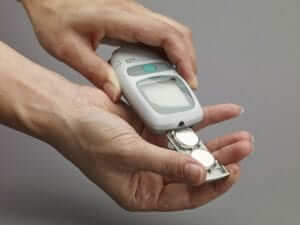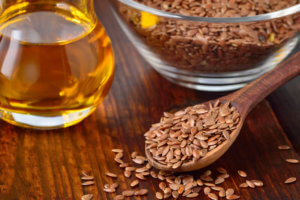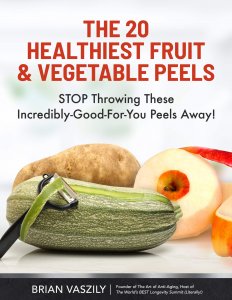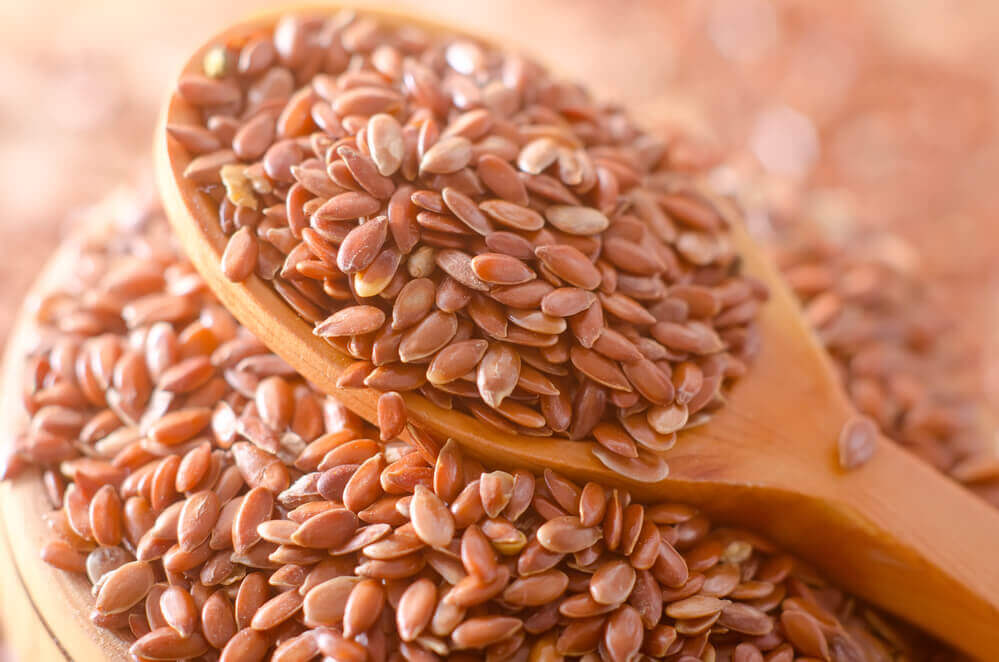Flaxseeds are one of the oldest cultivated foods to be used for their health-promoting benefits and absolutely deserve a spot at the top of the superfood seed list, right next to hemp seeds and chia seeds.
Despite their small size, flaxseeds are packed full of nutrients, antioxidants, and plant compounds that have numerous benefits for the human body.
In fact, you’ll be surprised at just how much you can get out of them by consuming only a tablespoon or two a day.
Here’s more on the story behind the flax plant and how these amazing little seeds can massively boost your health.
Where Do Flaxseeds Come From?
Flaxseeds come from a remarkable plant known as the flax or linseed plant (Linum usitatissimum).
Flax plants are somewhat unique because they are grown both for food and for fiber (much like the hemp plant). The seeds are harvested to be consumed whole or pressed into oil, while the fibrous part of the plant is used to make linen— a 100% natural fabric.
Linen, unfortunately, has become less popular with the rise of synthetic fabrics, despite the fact that it naturally repels dirt, resists microorganisms, and is stronger and longer-lasting than cotton.
Fortunately, this is not the case for flaxseeds, which are becoming more popular and making a name for themselves as a superfood.
“New” Superfood, Ancient Medicine
Although flaxseeds are being proclaimed a “new” superfood, they’ve really been used as food and medicine for at least 6000 years.
Flax plants are one of the oldest known cultivated crops, grown at least as far back as ancient Egypt and China. The plants were used to make clothing and paper, while the seeds were consumed to promote health.
It’s believed that Aztec warriors ate flaxseeds to boost their health and strength, and they are also said to be a favorite food of King Charlemagne (Charles the Great). The seeds have also been used in Ayurvedic medicine for a few thousand years and are thought to support overall health and immunity.
You can tell just how valued flax has been throughout the years from its Latin name— Linum usitatissimum— which translates to “very useful” or “the most useful.”
Top Health Benefits of Flaxseeds
Rich in Important, Health-Boosting Nutrients

Flaxseeds contain a variety of essential vitamins and minerals.
Just a one tablespoon serving of whole seeds will get you about 10% the daily value (DV) of magnesium, 13% DV of manganese, 11% DV thiamin (vitamin B1), and good amounts of phosphorus, copper, potassium, selenium, iron, and calcium.
The high magnesium content is especially notable because magnesium is a mineral many people are deficient in, yet one that is vital for proper sleep, brain function, heart function, and much more.
Along with being rich in essential nutrients, flaxseeds are also one of the best plant-based sources of omega-3. Omega-3s are the fatty acids also found in fish oil, although they take a different form in flax (more on that later). They are known to support mental health, heart health, skin health, and eye health— just to name a few examples.
And top it all off, flaxseeds are also the #1 food source of a powerful plant compound group known as lignans, which have multiple health-boosting properties.
Boosts Heart Health with High ALA Content
Flaxseeds contain a specific type of omega-3 fatty acid known as alpha-linolenic acid (ALA). This is a different type of omega-3 than the heart-boosting eicosapentaenoic acid (EPA) and docosahexaenoic acid (DHA) found in fish oil.
EPA and DHA are considered the “active” forms of omega-3 and for a long time have been thought of as more valuable than ALA.
This is because the process by which your body converts ALA into EPA and DHA is very inefficient, meaning you would need to consume a lot of ALA to get enough of the other two forms.
However, research is now showing the ALA has its own very significant health benefits in a similar way to EPA and DHA— particularly for heart health.
Recent studies have found that a higher consumption of ALA is linked to a lower risk for heart disease and a lower risk of heart attack. Multiple studies have also shown a connection between ALA and a reduced risk of stroke.
Specifically, the major health benefits of flaxseeds seem to be for lowering cholesterol levels and blood pressure, two huge risk factors for heart problems.
The seeds have shown an ability to lower LDL (bad) cholesterol and total cholesterol, while also raising HDL (good) cholesterol and reducing blood pressure, which is outstanding!
Supports Regularity & Gut Health

Most adults should be getting at least 25 grams of fiber per day, and often more, but many people are getting around 15 grams maximum— and frequently even less.
Adding flaxseeds to your diet can help you significantly make up this gap, since just one tablespoon contains about 3 grams of dietary fiber.
And there’s more good news.
The fiber in flaxseeds is a combination of soluble and insoluble, which work together to keep you “regular.” The soluble fiber pulls in water as it goes through your digestive tract, helping to keep your stool soft. Insoluble fiber adds bulk to the stool and keeps things moving.
Certain types of soluble fiber— like the kind found in flaxseeds— also act as a prebiotic to feed the good bacteria in your gut. This has long-lasting effects for digestive health and helps decrease the population of pathogenic (disease-causing) bacteria as well.
Fights Chronic Inflammation
Chronic inflammation is a huge epidemic in today’s world and a major contributor to many chronic diseases, particularly “age-related” ones.
Consuming more plant foods, especially those rich in antioxidants, is one of the best ways to combat inflammation, and flaxseeds are a great example of this.
The health benefits of flaxseeds for lowering inflammation come from several sources: omega-3s, fiber, and antioxidant activity.
Omega-3s are well-known for their anti-inflammatory effects, and ALA— the type of omega-3 found in flaxseeds— has been confirmed to have these properties as well. Studies have shown that ALA consumption decreases certain inflammatory markers and particularly reduces inflammation in the arteries (more good news for your heart).
Fiber is another inflammation fighter, although few people realize this fact. However, research has shown that consuming more fiber could be one of the best ways to reduce systemic (chronic) inflammation!
On top of this, the lignans in flaxseeds act as antioxidants to further combat inflammation at the cellular level, making these tiny seeds a great addition to an anti-inflammatory diet.
Excellent Source of Plant-Based Protein

Flaxseeds are one of the best sources of high-quality plant-based protein, which is good news for anyone wanting to follow a plant-based diet.
They aren’t a complete protein, meaning they don’t contain all nine essential amino acids, but they can be one of a variety of foods used to replace meat-based protein.
Interestingly, studies have turned up a few benefits of flaxseed protein that you probably won’t find in meat, including immune-boosting and antifungal properties!
Along with these extra superpowers, the protein in flaxseeds can also help with appetite control and weight management. Especially when combined with fiber, protein can help you to feel full and satisfied after eating, which helps combat overeating.
This, in turn, helps you to maintain a healthy weight more easily.
May Reduce Your Cancer Risk
As mentioned earlier, flaxseeds are the top food source of a type of compound known as lignans. These compounds are the main force behind one of the most significant health benefits of flaxseeds: cancer-fighting potential.
Research has shown that lignans possess antioxidant and estrogen-like properties. Both of these give flaxseeds the potential to reduce cancer risk, especially when it comes to hormone-related cancers.
A large study that involved over 6000 women found that flaxseed consumption was linked to a lower chance of breast cancer, reducing the risk by around 18%. Other studies indicate that this reduced risk for breast cancer associated with flaxseeds is even more pronounced in postmenopausal women.
Another study found that higher intakes of dietary fiber and lignans (both found in flaxseeds) may contribute to a lower risk of endometrial and ovarian cancer.
And to cap it off, a flaxseed-supplemented diet was also observed in one study to reduce the risk of prostate cancer, although more research needs to be done to confirm these results.
May Help Regulate Blood Sugar Levels

High blood sugar is a problem for many people and one of the biggest contributors to type 2 diabetes development.
Once again, plant foods can be incredibly helpful for controlling blood sugar levels because they are full of fiber that slows the release of sugar into your bloodstream.
Flaxseeds contain a good amount of insoluble fiber— the kind research has shown can reduce blood sugar levels.
Studies confirm this, with some showing that by adding 10-20 grams of flaxseed powder to their diets, participants were able to reduce their blood sugar levels by 8-20%.
More research is needed to determine how much flaxseed is needed and for how long it needs to be in the diet to make a difference, but it already has a lot of potential for diabetes control or prevention.
Boosts Skin & Hair Health
Along with lowering inflammation and supporting heart health, the omega-3 fatty acids in flaxseeds also give them health benefits for your skin and hair.
Alpha-linolenic acid (ALA) is one of two essential fatty acids your body can’t produce. When you consume it, it can be converted into the active forms of omega-3 (DHA and EPA) as well as an omega-6 fatty acid known as gamma-linolenic acid (GLA).
All of these fatty acids— and particularly GLA— are essential for maintaining young- and healthy-looking skin.
They help to keep your protective skin barrier intact, inhibit inflammation, and promote skin cell regeneration and wound healing. Fatty acids also contribute to a healthy scalp, which is key to nourished and healthy-looking hair.
By simply consuming foods high in ALA (like flaxseeds), you may even provide your skin with some extra protection against harmful UV rays that can cause premature skin aging.
Makes an ALA-Rich, Skin & Gut-Boosting Oil

Flaxseed oil made from cold-pressed flaxseeds has its own benefits that are worth mentioning.
To start with, it’s made up of even more omega-3 fatty acids than the seeds themselves, with ALA comprising about 50-60% of the oil. This means you can get a concentrated “dose” of inflammation-fighting and skin-boosting omega-3s by consuming the oil regularly.
Flaxseed oil is also a well-known remedy for constipation, in spite of the fact that it doesn’t contain any fiber.
Instead of stimulating your digestion like the fiber in the seeds would, it acts as a sort of lubricant, helping waste to “slip through” your digestive tract. Interestingly, studies have shown that flax oil can also ease diarrhea as well as relieve constipation.
However, one important note on the subject…
While there are undoubtedly benefits to consuming flaxseed oil— and it’s best to use raw instead of heated— flaxseeds are the better option to consume regularly and in larger amounts so that you don’t overdo it on fat and so that you get the benefits of lignans and fiber.
Get the Most Health Benefits of Flaxseeds by Using Them This Way
One of the best parts about flaxseeds is that you can get a huge number of benefits just by using a small amount of the seeds daily. Generally, 1-2 tablespoons of flax seeds is the recommended amount to start with to really have them make a difference to your health.
However, there are a few key tips to get the most out of flaxseeds.
First, try to choose organic flaxseeds so that you don’t have toxins from pesticides, chemical fertilizers, etc. interfering with the health benefits of the seeds.
Also, you want to consume ground flaxseeds because the whole seeds will simply pass right through your intestines without doing you any good.
However, flaxseed is quick to go rancid and lose many of its health-boosting properties after being ground. This means that the best option is to buy whole organic flaxseeds and grind them right before you consume them. They can then easily be sprinkled on food, added to smoothies, etc.
If you don’t mind putting a little more work into it, you can also try soaking and sprouting the seeds to improve mineral absorption.
And as a final note, be sure to drink plenty of water when you add flaxseeds to your diet to keep the fiber moving through your digestive system.
Eat More “Super Seeds”
While there are plenty of superfoods to choose from, “super seeds” are some of the most nutrient-packed and easiest foods to add to your diet. Don’t let their small size fool you— flaxseeds might just be one of the healthiest foods you can eat and come with major health benefits.
To get even more health-boosting benefits, rotate flaxseeds with chia seeds and hemp seeds in your diet as each one provides a unique antioxidant profile and together they give you a complete source of plant-based protein.
NEXT UP: Get Your Permanent Recordings & Transcripts of the Food Revolution Summit Docuseries FREE Today
 If you appreciate these helpful insights about flaxseeds, you are going to LOVE the latest & greatest Food Revolution Summit Docuseries!
If you appreciate these helpful insights about flaxseeds, you are going to LOVE the latest & greatest Food Revolution Summit Docuseries!
In it, world-renowned health leaders Ocean Robbins and Nichole Dandrea-Russert interview 45 of the planet’s top food experts, revealing the latest breakthroughs to best heal your body — with food!
And right now, you are getting immediate and permanent access to the complete recordings and written transcripts of the entire 2025 Food Revolution Summit Docuseries FREE when you order the recordings and written transcripts of the new World’s BEST Longevity Summit (which is available today with a special Early Bird savings of 66% OFF before the price soon goes up!)
Head here now to see this & all 19 of the amazing gifts you are getting today (worth over $1800!)
The experts featured in the 2025 Food Revolution Summit Docuseries include Dean Ornish, MD… Michael Greger, MD… Columbus Batiste, MD… Robynne Chutkan, MD… and more!
And, YES, you really will own the entire 2025 Food Revolution Summit Docuseries — all the recording and written transcripts, plus over $1000 of their additional gifts for you — as a free and immediate gift for you today….
When you order the new World’s BEST Longevity Summit recordings & written transcripts (which is 66% OFF today… you will pay just $67 TOTAL in today’s Early Bird special before the price goes up!)
PLUS, you are getting 18 more outstanding gifts in addition to the entire Food Revolution Summit Docuseries, so…
>>> Click here right now to find out more & order the World’s BEST Longevity Summit recordings & transcripts at 66% off today — do check out all 19 bonus gifts you get right away when you order today, including the entire 2025 Food Revolution Summit Docuseries!



Love flax seeds in dressings, smoothies and as crackers. Foods Alive make great flax crackers!!
Excellent article, I grind some seeds every other day for my smoothies ,salads, cereal and soups.
I also blend a tablespoon of oil in my fruit salad.
Thanks for the research
Do you use a coffee grinder or a salt & pepper grinder?
A coffee grinder works perfectly! Be sure to use the flaxseeds immediately after grinding for the best benefit.
I drop mine in my blender, nutribullet and that does a good job as well.
Very educative. l grind mine before using it. thank you for the information.
Very very informative , I really appreciate all your research and detailed information actually lots of it that I always wanted to know more !!
Thank you !!!!
Aida
well Hello another A
rmenian…..i DO know that I am scotch .My husband was an Armenian fro the middle of Turkey
excellent report
Great article and and very informative. I’m blessed with good health 71 years young and I know I’ve worked for it. I will be re-adding flax to my food intake. Thanks.
Naturopath suggested flaxseed for gut help couple years ago but dont have to be crushed
Yes the flaxseeds need to be crushed, otherwise they glide richt through your system
and flush them out before they are of any benefit to your body.
Eat my first flaxseeds today and loved the taste! Please forgive my ignorance, but when you say crushed, do you mean into a fine powder with a pestle and morter?
I guess you can do that and it should work. But I think he meant ground, like you’d grind coffee. They sell whole flaxseeds in a bag, and you can buy an inexpensive coffee grinder, many run on batteries, and grind them as you need them. It’s what I do.
I buy organic ground flaxseed by spectrum on Amazon.
That would work, or you could also use a small electric coffee/spice grinder.
I grind mine in a bullet. John Baskin uses a coffee grinder. Best to grind them some how.
Hi,
I like to include them in my coffee mill which I use to grind nuts & seeds into a coarse powder since I’m a toothless old guy & can no longer chew.
The coffee mill & the blender do my chewing for me, making dentists, implants, plates, tooth brushes,, toothpaste, dental caries, dental bills, &
dental plan premiums obsolete 🙂 Viva the toothless!!
Good for you not falling for the implant epidemic. I’m heading for toothlessness and glad to know there are others that can make it work for themselves.
Dead on Hilda, flaxseeds need to be crushed
If you have a good blender the seeds will be crushed if you are putting them in your smoothie. But if you are just putting them in say, a meatloaf, you need to crush them. I too use a coffee grinder and it works splendidly.
Thank you for the great articles, Brian. And my granddaughter and I look forward to your jokes too! She is seven, so is starting to understand the double meaning behind the jokes! Fun!
A joke for your granddaughter – the only joke I can ever remember:
What do John the Baptist and Winnie the Pooh have in common?
Answer: They have the same middle name
(or you can use Atilla the Hun, or any number of others)
😂🤣
I find this very interesting thank you
Thank you most sincerely for the above info on Flax Seed ,So well put and easy to read,I have had a box for weeks unopened.
Now you have given me the knowledge and benefits I will most defiantly be making them a part of my daily diet
Many many thanks. love and best wishes to you and yours.Julie
I don’t think you’ll be defiant. Definitely tho is certain.
yum yum enjoy!
Love this I have been consuming ground flax for 15years and turned my bad cholesterol into good cholesterol, my doctor was quite impressed!
That’s one of the main reasons I started eating ground flaxseeds. I also buy flaxseed oil with ligand at Whole Foods and use it as my salad dressing. It’s an acquired taste. My husband hates it but I love it – and I take no meds for cholesterol!
Thank you for this article, which gave me many facts, so far unknown, but also to your contribution during the many health-summits .
excellent article!
Have been taking flax seeds and chia seeds together for many years. Another benefit used by me and a number of my family and friends: Flaxseed taken faithfully every day will completely stop all menopause symptoms – hot flashes, night sweats etc. Your article was vey informative.
I am 94 now and have been taking flax seeds for many, many years and I also had no menopausal symptoms. I also grind other seeds and nuts to go on my breakfast of fruit and Greek yogurt. Joan
any suggestions on how to grind flaxseed for consumption (without ruining your coffee grinder, which I did) ? Thank you for this informative article
I first add herbs like tea to my coffee grinder, then seeds like flax. Good result! Try.
I buy mine ground & keep them in the freezer.
Ouch!… so sorry you ruined your coffee grinder. But I have found that flax is soft enough to grind in your teeth, so it requires very little grinder power. I use a Proctor-Silex specifically for my seed needs, and another, heftier grinder for my coffee. I too am going to amp up my intake of flax, thanks to this article. In the past, if my hair ever looked limp, I just started eating flax and it would perk up and thicken. Will take it daily now, even if just a small chewable handful. I now have a pretty container of flax next to my computer. 🙂
I have three coffee grinders. One for coffee, and the other two for grinding nuts and seeds. I grind my flax seeds every day and add them to my steel cuts oats for breakfast. Not sure how you ‘ruined’ your coffee grinder. I use a little brush to clean the ginder and get all the flax I can out each time. To thoroughly clean the ginder I wash the lid and wipe the inside with a paper towel.
very informative page.tanks!
Great article. Thank you.
Thanks for all the details. I have been consuming ground flax seeds for years. It is wonderful to be more fully informed about ALL of the benefits.
Great article; thank you. I make an almond milk/blueberry smoothie daily. I add freshly ground flax seeds, plus chia seeds, and hemp hearts. Your article says to “rotate” these seeds. Is it ok to use all 3 at once?
Why are you asking permission of someone else when your own experience is the teacher? You have inspired me to mix the three… they are all WONDERFUL.
Thanks for this rich info on the nutrition of flax seeds. I have recently started taking chia seed oil in capsule form. Good to know I can switch up with flax seed. Thank you so much for sharing. Every blessing, Beverly Simpson
Thanks Brian, a good article. A friend of mine Patrick Halford , a dietitian, always grinds 50% flax seed to 25% sunflower and pumpkin seed. I’ve used it daily ever since on porridge, salads and soup. Whatever you fancy really.
It’s a pleasure to read this info without having to go thru so many videos with the person going into intimate details of his live and his patients, before coming to the conclusion.
Many thanks
Thanks ever so much for writing and sending this wonderful article!
This is great information!
Toasting the seeds makes a huge difference to their flavour, & palatability.
Keep in mind heat destroys the nutrient value.
So, should we have to stop cooking many our foods?
Thanks for the great information and the nudge I needed to bring them back into my life. I make porridge with Flax, Chia, Pumpkin seeds, nuts, coconuts and boiled water. I add a banana and sometimes an apple to make it creamier. Great for the gut and inflammation. A wholistic nutrition provided the recipe. Can be a smoothy as well.
You don’t need always to have a recipe.
What My wife does is to let them soak in water before coming to bed and use them more or less with every thing, as desired, and every day!
Thank you for your great, very informative article adding extra knowledge to my existing understanding.
What an amazing little seed!
Melanie
Thank you for such an amazing article. Flaxseeds are a game changer and I am looking forward to adding them to my diet as they are high in magnesium and in omega3. Keep up the great work.
Thanks so much for healthy tips
Have used flax and chia seeds for some decades (usually in porridge mixes) and your quite comprehensive article here is well appreciated as is my own continued health. Thanks. James Dart
This wonderful article reminds me that I already have flaxseeds in the freezer and need to make Buster Bucks’ World’s Best Flax Seed Bread Recipe again soon! Thanks so much
Thank you! Informative. A pleasure to read.
Thank you so much. Thus article is so informative. I have never used it before, but will be a must try for me now.
Have only one problem using crushed flaxseeds.
They have the effect of increasing my very regular bowel actions into
far too many of them, not comfortable at all.
Mary
Thank you so much for this very informative article. Flaxseeds are so little. I would have never thought they served such great importance to our bodies. I have learned a lot. I am going to add it to my diet.
Seeds: Flaxseeds, hemp seeds, chia seeds, pumpkin seeds, how many nuts, etc.
Is it any wonder seeds which sprout life are considered ‘superfoods’.
Many flowers, which produce precious seeds, are also quite wonderful. Bachelors Buttons, Bee Balm, Begonia, Borage, Calendula, Carnations, Chamomile, Chives (and other alliums), Chrysanthemum, Clover, Dandelions, Fruit Blossoms (Apple, pear, plum, citrus, etc), Hollyhock, Lavender, Lilac, Nasturtium, Rose, Squashes and SO many more.
When you think about it, how incredible it is, that the beginning of life (flowers and seeds) are so extremely beneficial for ALL life on this planet.
so beautiful thank you .
A thorough and informative article. I have been a fan of flaxseeds for about the past 8 years. I sprinkle it on oatmeal and other dishes.
Very good article! I use flex seed and chia
In my juice everyday.👍👍
This is a well researched article, with very good information Thanks Brian. Blessings
Terrific article. Flaxseed effect on prostate and heart issues are true from my experience. Heart improvement is measurable but prostate effect is not easy. However for prevention they are a tasty seed. I lightly roast them and then powder it and use it on fruits.
YAY o the article ! Trudi Dido
I’ve heard that flaxseed vibrates at the same rate as some of the rays of the sun and consumption will keep you from burning. I’ve found this to be true!
Thanks for all the useful information!
Much interesting info that I didn’t know! Thanks for collecting it all together!
This was a very informative article on flax seeds. Thank you! I wonder if there is one great recipe I could introduce this gem to those who rely heavily on the S.A.D. ?
I prepare a muffin with :
1/4 cup of ground flaxseed
1 teaspoomn of cinnamon
1/2 teaspoon of turmeric
1 table of MCT oil (optional)
1/2 teaspoon of stevia or
1 table of Erytritol ( if you do not like stevia)
MICROWAVE FOR 1 MINUTE
I love it !
Sorry, I forgot the most important ingredient of the flaxseed muffin:
ONE EGG
I have been taking Flaxseed capsules (liquid filled) for years. I started taking them for the Omega 3. But now I am glad to hear there is more to Flaxseeds than I had thought. Great article, and the son joke, as opposed to the Dad jokes.
I have used flax seed, pumpkin seeds and sunflower seeds ground together in small quantity and keep in fridge for about 20 years . Use on cereal,smoothies, salads etc. Along with hemp and chia in smoothly or porridge.
All organic.
I use ground flaxseeds, chia seeds and hemp seeds daily. I started consuming them more than six years ago after developing fibrocystic breasts after age 65. I buy organic seeds, keep them in the freezer and grind them daily for daily use. They are included in a variety of whole foods I include in my WFPB lifestyle.
Loved this article. Very informative. I use flax, chia and hemp seeds on salads and in smoothies. Good to understand the nutritional values better. Thanks.
Thanks Brian: I have been putting flax seed in smoothies ands oatmeal for several years. Just started using chia and hemp. By rotating use of these 3 seeds do you mean every other day?
Thank you, I certainly appreciate this information where I continue to learn new things to improve my health. As someone age 83, I do indeed have some health issues that need working on, so I am searching for ways to heal myself. thank you.
Brian thank you so much for posting such an informative article. I truly appreciate receiving such articles, the contents of which are very valuable. All the best to as you enter your “Personal New Year” Many happy returns!
Thanks!! I enjoyed the article & learned a lot.
Hi Brian, First heard about linseed when my daughter’s equestrian instructor suggested boiled linseed added to her show horse’s food for a shiny coat. I have it regularly together with sunflower seeds and almonds, LSA Jokingly called LSD in our family.
I have been eating flaxseeds for 30 years. I determined years ago to grind them by putting a tablespoon in my mouth and chewing( very simple). When I eat near daily my HDL cholesterol stays in 70’s-80’s . I have a receipe I intend to try today after reading this for seeded crackers with sunflower, hemp, chia, and flax made with almond flour. Thanks for the reminder about the storehouse of benefits from that humble little seed Brian.
Love all your interesting articles Brian and your Dad jokes ! Your infectious enthusiasm is very refreshing. I’m on a healthy streak this year and you are on my best go-to reference list ! You are an inspiration to us all!
I just need to know where I can get it here in the UK.
Hi Brian,
Thanks for your information on flaxseed etc. Can I eat flaxseed or chia seeds
with gluten free bread?
Thanks,
Darby Ringer
Thank you, I am going to add Flax seeds to our family diet.
I thought the comments will never end. thanks for all the information about the flax seed I have
been using it but I did not know that this seeds is very useful in our heath thanks again, may God bless you always you are very kind.
Brian,
Thank you for all your useful health tips. You have helped many people to have a healthier lifestyle.
Great and informative article. I never knew I had to grind them but will be doing that in the future! Thank you!
We’ll thank you!
This helps explain why our WFPBNO doctor recommends 1-2 tablespoons each day.
Though we use the seeds already ground, I think that the next bag will contain the whole seed. A bit more work but sounds like a good move.
Great article. I love learning about a healthier way of eating. The tips on how to prepare the flaxseeds was of great benefit to me.
Thank you so very much
Mary Duke
What happens to flax seed if used in baking?
99 percent of the mornings I eat a bowl of oatmeal for breakfast. Oatmeal by itself is tasteless so I ad 2 T of raisins, 2 dates, 2 dried plums and 2 T spoons of blueberries. Since I love fruit, this combination gives it all kinds of flavor.
I learned from an Ayruvedic practitioner to make flax seed tea. You can eat the seeds while you drink it. I do this to stay regular. Helps a lot. You can also make a hair gel out of flax seeds, but that’s off topic! The tea is really great. I know you are cooking them, but this is to get the gel and the seeds to help move everything through the colon. Tastes great as well. Try it!
I’ve always heard that flax seeds were NOT a good choice for men because of estrogen; it’s better for men to consume chia seeds!
Great article. I’ve been using flax seed in and on my foods, smoothies, etc. for years.
Joke: What is the strongest animal in the ocean?
Ans. The muscle : )
Thank you so much for all the information. I have 2 health problems that using more flax seed may help. God bless
Question:
I live alone. I buy ground organic flax/chia seed combo and keep in Freezer. I take out a small portion and put in fridge each week to use up.
Will that suffice at maintaining the nutritional value? And prevent from rancid…
I just soak my flax seeds in water for an hour or two, or even overnight, and drink ’em down!
some research claims you should not take supplements within 2 hrs of flax seed cause it interfers with Absorbtion of nutrients
Thank you so much Brian!!!
Excellent report. I usually have the seeds whole I didn’t realize I needed to grind them. I use them in smoothies. Would really like to know how else to use them. Thank you for the message
What a wonderful article. We too have been eating crushed flax for over 30 years. We are farmers so I have been sharing recipes using healthy seeds since 1988 on my website. When my daughter-in-law researched flax in University they gave the people in the study a muffin each day. They were not tasty so I decided to write A MUFFIN A DAY cookbook & share delicious muffin recipes that each had 2 heaping tablespoons of crushed flax in.
Then I too started baking a flax muffin in a mug using the 1/4 cup crushed flax in the microwave. So I opened up the binding of each cookbook and added that recipe plus the many ways I add other healthy ingredients to the recipe to my cookbook.
Our daughter-in-law worked on her doctorate on the benefits of flax on the heart at the St Boniface Research Centre in Winnipeg. Her best results were consuming more than 2 tablespoons flax so we try to have at least 3.
As this article mentions, flax is a super food. Every morning we have 2 heaping tablespoons crushed flax plus hemp seed on our homemade granola that includes all kinds of seeds, rolled grains and nuts. I add crushed flax to our bread and as well make that muffin in the micro wave often so we can have a slice as a snack during the day.
My father said that his grandma used a flax seed placed under his eye lid to flush out debris out of his eyes.
When wet they produce a slippery surface to help the tears to float out the debris !
What about buying FLAXseed OIL pills from someone like Nature Made? Contains 1,000 mg (500 mg of 0mega 3) and other good items mentioned in the article. Easy to take. Is there some reason my buying seeds instead, and grinding them, would be significantly better? Over time, is the flaxseed oil method much different than eating the ground seeds?
Flax seeds and cold pressed flax oil was featured in a cancer remedy by Johanna Budwig that combined the two into a sulfur rich yogurt like substance called Quark. Today it is mixed in cottage cheese.
Johanna was a German biochemist, a seven-time Nobel peace prize nominee and considered an expert on the topic of fats and lipids.
She said flax seed oil was a rich source of electrons. That’s interesting because we are electrical beings, and when our cellular voltage gets low, disease moves in.
If you compare the success of improving the electron field of cells with other means such as high dose vitamin C, CLO2 or EDTA, you start realizing the important role electrons play in our our health.
I use a coffee grinder to for the flax seeds. Once I’ve ground up enough store
them in a glass jar in the refrigerator. Then they are ready to add either to oatmeal
for breakfast or homemade cookies. Along with brown rice flour and other ingredients
from the health food store or my pantry. An added bonus for those cookie lovers, like
my husband Lee. Who’s lactose and wheat intolerance.
Brian,
Thank you for this article. I had been adding ground flax seeds to yogurt, etc. but forget why I stopped. Learned years ago about feeding them to my horse for a shiny coat, and think they improved my hair too! Good reasons to go back to using them, although I prefer the pre-ground for convenience.
To ease any excuses about not taking it… I grind a quarts worth and freeze or put into frig. Gone before a month is up. Also used as an egg in baking if I don’t have eggs or want to add more fiber to my baking.
One tablespoon of ground flaxseed mixed with 3 tablespoons of water that is allowed to sit for at least 3 minutes can be used to substitute one egg. I do this all the time when baking-sometimes because I am low on eggs. Works great.